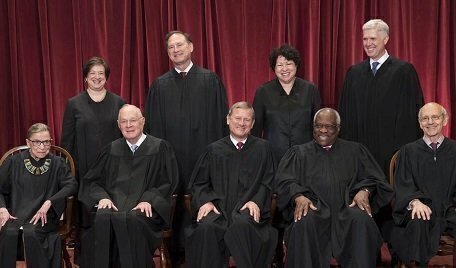
In an 8-1 decision on Tuesday, the Supreme Court said police in Virginia couldn’t use a Facebook photo as cause to examine a motorcycle under a tarp parked next to a house, without a search warrant.

In Collins v. Virginia, the question was about the Fourth Amendment’s “automobile exception,” which that states if “a car is readily mobile and probable cause exists to believe it contains contraband, the Fourth Amendment . . . permits police to search the vehicle” without a warrant.
Police in the case saw the picture of what they believed was a stolen motorcycle, and then entered private property near the outside of the house, called its curtilage, to examine it under a tarp, without the warrant. Ryan Austin Collins of Charlottesville claimed Virginia’s courts expanded the automobile exception beyond precedents set the Supreme Court.
“Contrary to Virginia’s claim, the automobile exception is not a categorical one that permits the warrantless search of a vehicle anytime, anywhere, including in a home or curtilage,” said Justice Sonia Sotomayor in the majority opinion. “This Court has long been clear that curtilage is afforded constitutional protection, and creating a carveout for certain types of curtilage seems more likely to create confusion than does uniform application of the Court’s doctrine,” she said.
“Virginia’s rule also rests on a mistaken premise, for the ability to observe inside curtilage from a lawful vantage point is not the same as the right to enter curtilage without a warrant to search for information not otherwise accessible,” she concluded.
The Supreme Court remanded the case back to Virginia to consider if the warrantless curtilage search may have been legal for another reason, such as an exigent circumstances exception.
Justice Clarence Thomas concurred with the majority on the Fourth Amendment issue, but he doubted the Court’s precedent that the evidence must be excluded from the case could apply to states.
In the only dissent, Justice Samuel Alito said the Court’s majority opinion itself was unreasonable. “The question before us is not whether there was a Fourth Amendment search but whether the search was reasonable. And the only possible argument as to why it might not be reasonable concerns the need for a warrant,” Alito said. “For nearly a century, however, it has been well established that officers do not need a warrant to search a motor vehicle on public streets so long as they have probable cause.”
Alito saw the police officer’s actions as needed and immediate. “In this case, the Court uses the curtilage concept in a way that is contrary to our decisions regarding other, exigency-based exceptions to the warrant requirement,” he said.
The automobile exception is based on a 1925 Supreme Court decision, Carroll v. United States, made during Prohibition.
Collins had lost his case in the Virginia Supreme Court, which ruled the case was “more appropriately resolved under the automobile exception” than under the home privacy rationale. But Collins’ question to the Supreme Court was “whether the Fourth Amendment’s automobile exception permits a police officer, uninvited and without a warrant, to enter private property, approach a home, and search a vehicle parked a few feet from the house.”
Scott Bomboy is editor in chief of the National Constitution Center.